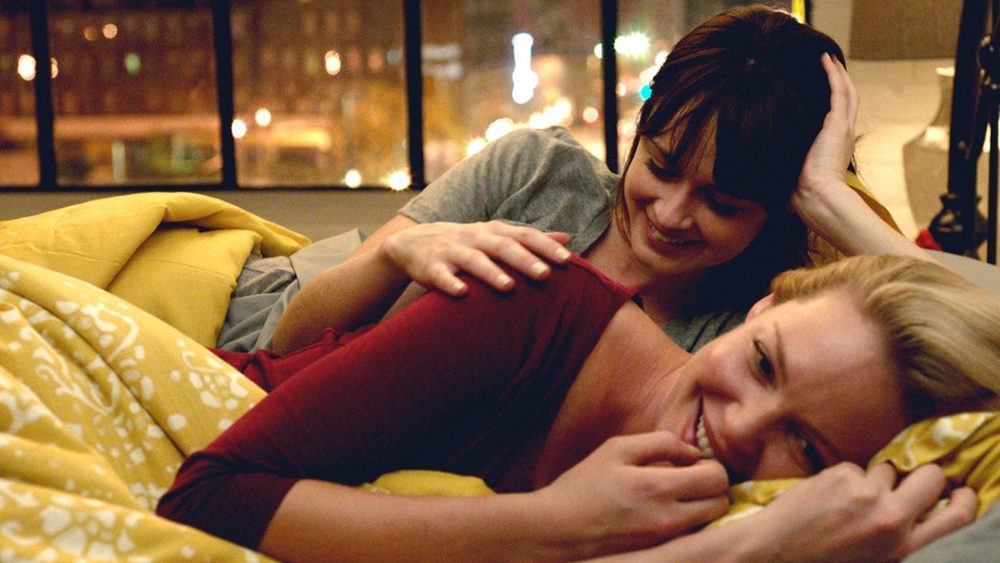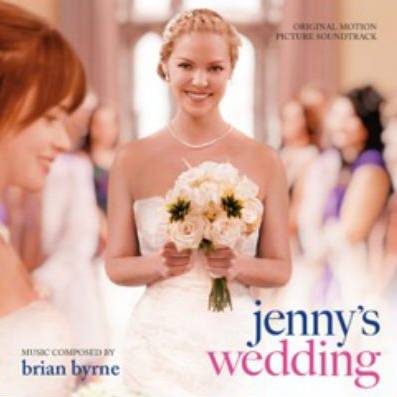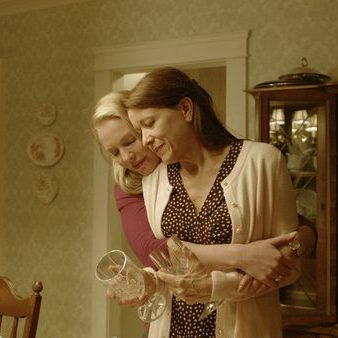
Jenny Farrell has led an openly gay life – except with her conventional family.
When she finally decides to start a family and marry the woman they thought was just her roommate, the small, safe world the Farrell’s inhabited changes forever. They are left with a simple and difficult choice – either change with it or drown.
It’s spring; we’ve turned the page on the vernal equinox, and we’re peeking out from under those tightly crocheted wool caps. No, not the hipster ones, the functional ones.
The days are longer, the birds are singing, and we’re heading into those often uncertain months of alternating storm and calm…yes, it’s wedding season. Invitations requesting my presence began arriving just last week, none more anticipated than the impending nuptials of Jenny’s Wedding.
Now when I say Jenny and I are family, it may not be what most would think. We don’t share any mutual alleles; we look nothing alike; we have no extended, in-law connection; in fact, I’ve never even seen the blushing bride. Family? You bet.
Here, I’ll let a couple of people who produced Jenny explain.
I sat down with the producers of Jenny’s Wedding, Michelle Manning and Gail Levin, and I asked them…
Tell me about Jenny.
M: It’s a movie about a family, a very tight-knit, and conventional family.
G: I liken it to a present-day Guess Who’s Coming To Dinner where you have two strong parental characters that love their child so much and have taught her exceptional values, but she has chosen a mate who is unexpected.
In the case of Guess Who’s Coming To Dinner, it was an African-American male, for Jenny, she wants to marry her long-time partner, who is a woman. The story is not necessarily about the relationship between the two women, which is solid from the beginning; it is more about the relationship between Jenny and her parents and her siblings.
Mary Agnes Donoghue, our director, says there are no villains in this movie. Everybody loves each other in this family. And even though there’s a time when accepting Jenny for who she is, is difficult, you really can understand the emotions the parents are going through.
The movie is set in Cleveland…why Cleveland?
M: The director, Mary Agnes Donahue, knows Cleveland very well. And it is Middle America; it is Anytown, USA.
G: The way the city looks, the housing and neighbourhoods all seem to fit into the world of the Farrell family that Mary Agnes wrote about.
Much as we saw NYC as a character in Sex and the City, will Cleveland be a character in Jenny’s Wedding?
G: Absolutely.
M: We are one of the few films who went to Cleveland to shoot as Cleveland, not shoot Cleveland as New York City.
G: We found Cleveland, and we embraced it.
How did From The Heart Productions, a nonprofit that provides grants to films of social importance, get involved? And what have they provided in the crowdfunding arena?
M: When we went to Indiegogo, we strongly wanted the ability to have a fiscal sponsor like From The Heart so that we could give back, so a portion of the proceeds we raise for licensing music for the movie will go to PFLAG Cleveland. Having [From The Heart] as our fiscal sponsor made it possible for all donations to be tax-deductible*. We love Carole Dean [President, From The Heart Productions] and what she stands for; her foundation takes the proceeds that she is getting from our campaign and will go to a grant that she will offer to filmmakers.
*The entire contribution is tax-deductible, so for those of you looking for a little relief from Uncle Sam, this could be a win/win.
This is a very talented and heralded cast, (Katherine Heigl, Tom Wilkinson, Linda Emond, Grace Gummer, Alexis Bledel) what was the casting process like…do you look at it from creating a family point of view?
G: As a producer, you do oftentimes package the leads. I worked very closely with Mary Agnes, our director, and with Michelle to put the family together.
M: The remarkable thing, and we can’t stress this enough about this movie – the cast, all of us; this was a true labour of love, and what’s amazing, when we all got together in Cleveland it was a real family. We had family dinners every night. And when we saw the movie for the first time, we had such joy for this family. You love this family, and you identify with this family in a most profound, very moving way.
G: All the actors truly loved each other. They were delightful. We worked on the movie for three, six-day weeks, and it was very challenging, with a challenging budget, but all the actors loved being on set. We were a real team and it created a great vibe on the set. One reason is we had a meeting right before the movie…
M: And everybody in the cast had their own personal reasons why that meeting was important to them.
G: We had one actor who had just come from a weekend where her two very good male friends got married. We all want to be entertained, we all want to tell stories, but if we can enlighten people, or when they leave the theatre they feel differently, having changed a little bit… The one thing that our PFLAG friends tell us is that it’s great to tell movies where it normalizes gay children getting married. We get notices from young people out there who say, “this is our story; we want our parents to see it.” It melts our hearts.
The Indiegogo campaign is only for funding the soundtrack to the movie, is that correct?
M: The money for finishing the film is in our budget. We want to get more recognizable songs to appear to a wider audience with this message.
Is that process of picking artists similar to casting another character?
G: I think it’s the same creative process, but they are very different. You read a role, and you read a page of dialogue and you envision the actor as you are reading it, with the soundtrack you sort of…
M: You have a movie, and you want to marry the songs to that movie instead of words on a page.
With the success of Veronica Mars and others, and with studios seemingly looking mainly for opening weekend numbers and a male demographic, how has crowdfunding changed the process of independent filmmaking?
M: I feel that it could become the future. Having been at Paramount for over 15 years, we made movies like In and Out, The Hours, First Wives Club. Studios don’t make those kinds of movies anymore. I gather what you just said about the opening weekend of young boys and robots and explosions and transformers. The kinds of stories we all loved; the studios aren’t doing that anymore. Independent movies are turning toward crowdfunding, and I feel that the people who are responsible for bringing it to crowdfunding, and those actually funding the movie, are the people that want to see those films get made and want to feel a part of it.
G: It’s really interesting going through this process. When we get people donating and telling their stories, it creates a community. It makes it more about the message of the movie and how important it is to the people out there than just Hollywood alone. And it doesn’t have to be a message movie, but when you start reaching out to people and they want to help you and be a part of what you are doing, it becomes a human community that is really great. As filmmakers, you might go to a theatre and be around people who watch your movie and you get a thrill out of that, but this brings you closer to your audience, and it’s really heartwarming.
M: We had the money to make the movie, but this experience with the crowdfunding for the music, it forced us to create a social media presence much earlier than we ever would have. Between our Facebook and our Indiegogo page, the sense of community; we are not Veronica Mars, we don’t have a built-in audience, but we are gathering this core group of people who want to see this movie. And the community keeps growing and interacting with each other. It’s quite interesting.
G: [After personal rant of my love/hate relationship of social media – #NoOneCanSpellAnymore] I still use White Out!
M: She does!
G: What’s so great about this story, and whether it’s a story about anybody who feels left out, feels bullied or outcast, or who doesn’t feel like they fit in, any of these stories speak to young people and can make someone feel better about themselves and feel like they can have some support, is a good thing.
Tell me something about the production that no one knows, something you came home at night and said OMG, you won’t believe what happened!
M: [Laughter]
G: Michele has some good ones.
M: I can send you before and after photos. With Grace Gummer’s character, Anne, the sister, there is a whole recurring thing about dead grass. We were wrapping the first day and the crew began talking about the “lake effect”. I had no idea what they were talking about.
The next day, I wake up to take my dog, Hildy, who is in the movie, to do her business, and it’s white. We got to the house where we were supposed to shoot this dead grass, and the entire house is white. We were shooting interiors and everyone that wasn’t involved in that was outside shovelling snow off the grass and beating the snow off the bushes and keeping the remnants of the white off the grass.
And once we did that…it started snowing again!!! We ran to Walmart to get a tarp to cover it so that when we went to shoot the dead grass everyone had to pull off the tarp, we got the shot and kept going. That’s when I realized everyone was in this for the love of it. They stopped what they were doing, picked up a shovel, picked up a broom…everybody.
So, Jenny is family. No, not in the genetic sense, but in the familial sense of community and humanism. And with any good human interest story, there is the underlying foundation of courage. Yes, Jenny is courageous.
She admits to her parents that her “roommate” is someone she sleeps with and not next to. We often recognize that kind of courage in those of us who grow tired of living the lie and dare to live our truth. What is overshadowed at times is the mettle of parents. Through no real fault of their own, they create for their sons and daughters this expectation of life similar, but better than their own.
When suddenly faced with a scenario different, and perhaps less safe from the one they envisioned, fear sets in. And then what? It’s fight or flight, and it is too simplistic to say running is the weak way out. Many run at first, but I believe Jenny’s parents will stop and turn around in the face of fear. I have hope this family will retreat long enough to regroup, pick up the PFLAG, and make a charge in support of love, honour, and acceptance. That, my family, is heroic.


